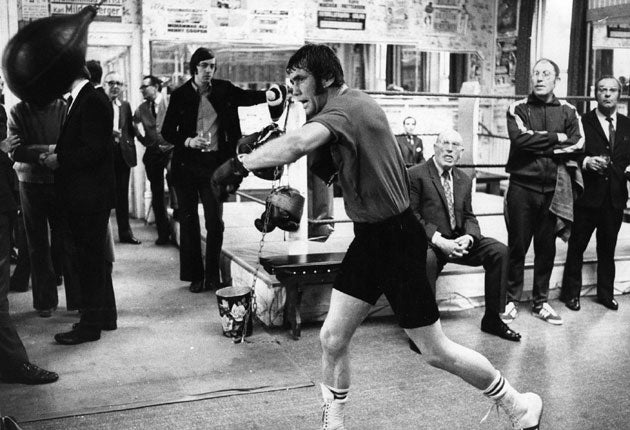Chris Finnegan: Olympic boxing gold medallist who became European champion

Your support helps us to tell the story
From reproductive rights to climate change to Big Tech, The Independent is on the ground when the story is developing. Whether it's investigating the financials of Elon Musk's pro-Trump PAC or producing our latest documentary, 'The A Word', which shines a light on the American women fighting for reproductive rights, we know how important it is to parse out the facts from the messaging.
At such a critical moment in US history, we need reporters on the ground. Your donation allows us to keep sending journalists to speak to both sides of the story.
The Independent is trusted by Americans across the entire political spectrum. And unlike many other quality news outlets, we choose not to lock Americans out of our reporting and analysis with paywalls. We believe quality journalism should be available to everyone, paid for by those who can afford it.
Your support makes all the difference.Chris Finnegan had his first professional fight behind closed doors at an exclusive Mayfair club seven weeks after winning the Olympic middleweight gold medal at the Mexico City games. Finnegan was Britain's first Olympic boxing gold medallist for 12 years and after his victory in late October 1968 against the brilliant Soviet Aleksey Kisselev there was a gap of 32 years before Audley Harrison won a gold in Sydney.
Harrison signed a multi-million deal with the BBC, fought in front of 8,000 at Wembley and was watched by six million people on television when he had his first fight. "Good luck to the fighters now," Finnegan said last year. "I don't begrudge 'em a penny. I just wish that we had all been looked after a bit better."
In 1968 before the Olympic Games, Finnegan was working on building sites as a bricklayer and was not even the British amateur middleweight champion when selected for the games. He was a veteran of the European championships held in Rome in 1967 and he had boxed against Denmark, Romania, Scotland and Ireland. He joked before the start of the Olympic tournament in Mexico that he had done his altitude training at the top of a 35-rung ladder. He beat four men in 11 days to reach the final against Kisselev, and after an agonisingly long delay at the end of the contest he was awarded a majority decision of 3-2. "I'm not just a silly old bricklayer now," he exclaimed when he was interviewed.
He turned professional as a light heavyweight and within two years fought and lost over 15 rounds for the European title against the Danish idol Tom Bogs in Copenhagen. It was Finnegan's first defeat in 15 fights but in January 1971 he won the British and Commonwealth versions with a 15th-round stoppage of Eddie Avoth. His two fights with the stocky and bald German Conny Velensek for the European light-heavyweight title ended in a controversial draw the first time they met in Germany, and an easy win for Finnegan when they fought in 1972 in Nottingham. Velensek wore a wig throughout the week of the fights and only removed the toupee when he climbed through the ropes.
"I looked at him the first time and I swear I didn't recognise him without the syrup!" Finnegan said. "I thought they had switched opponents on me."
In September 1972 Finnegan entered the ring at Wembley as the British, Commonwealth and European champion to challenge the world champion Bob Foster, a sheriff from America. It was a fantastic fight and Foster is still considered one of the best light-heavyweights in history. It ended in round 14 when Finnegan was dropped for the full count. The Ring magazine, at the time hugely influential, named it their fight of 1972. The magazine had named Muhammad Ali against Joe Frazier as their 1971 fight of the year and in 1973 selected Frazier against George Foreman.
"When Bob hit me it was like being hit with a scaffold pole with a glove on the end of it, and I know a bit about scaffold poles," said Finnegan, who amazingly was back in the ring in a 15-round fight seven weeks later. However, he lost his European title and in many ways it was the start of the end of his career.
In 1973 Finnegan had the first of his two epic struggles with John Conteh when he lost on points. He was stopped on cuts in a bitter and acrimonious rematch the following year. Conteh still maintains that Finnegan was the toughest man he ever met and in retirement they both helped each other drink to worrying excess.
Finnegan won and lost the British title in 1975 in fights against Johnny Frankham but he was forced to quit the ring the same year when he suffered a detached retina. Ali donated a pair of signed gloves to Finnegan's benefit night.
Last October, as Finnegan was drinking and laughing at the British Boxing Writers' annual dinner, his younger brother Kevin, who was also a British champion, died alone and lonely in his Hillingdon flat. Finnegan never really recovered from the death of his younger brother and in the middle of February he was admitted to Hillingdon hospital with pneumonia. He was 64 when he died there.
Christopher Martin Finnegan, boxer: born 5 June 1944; married; MBE 1969; died Hillingdon, Middlesex 2 March 2009.
Join our commenting forum
Join thought-provoking conversations, follow other Independent readers and see their replies
Comments